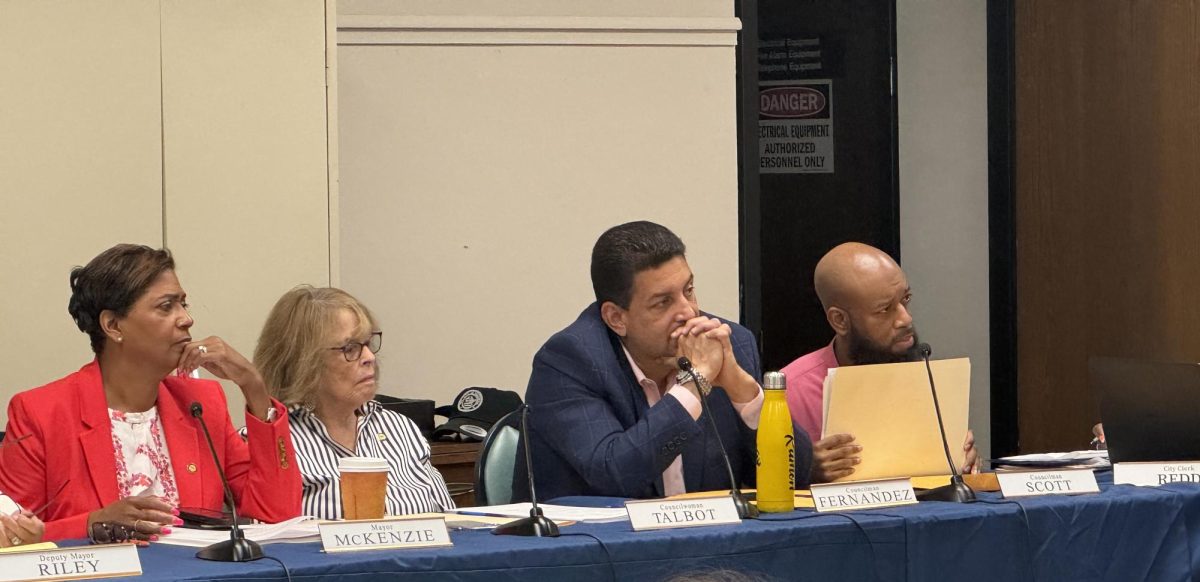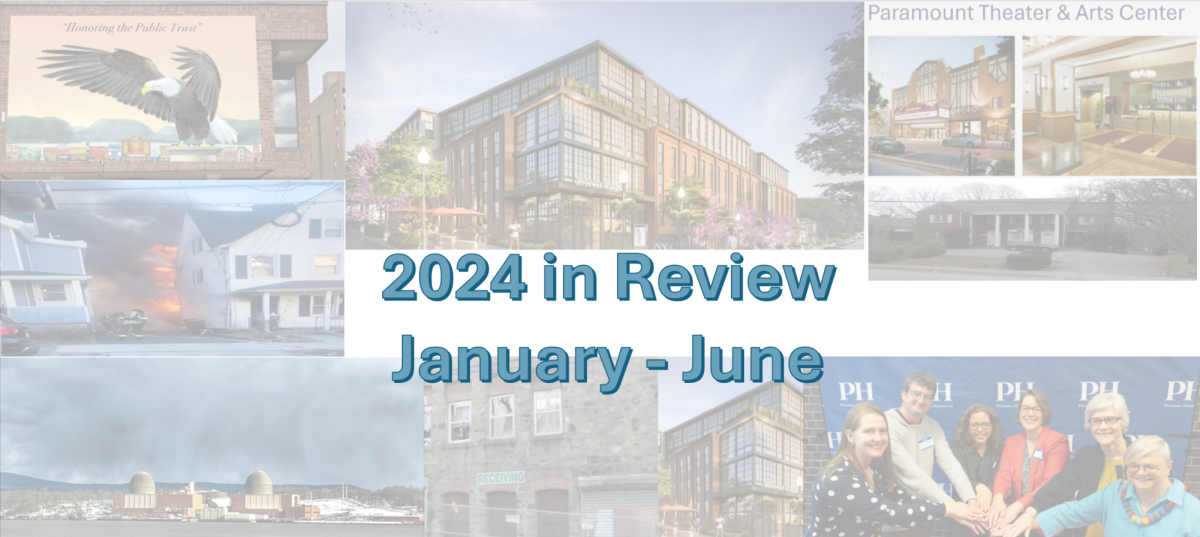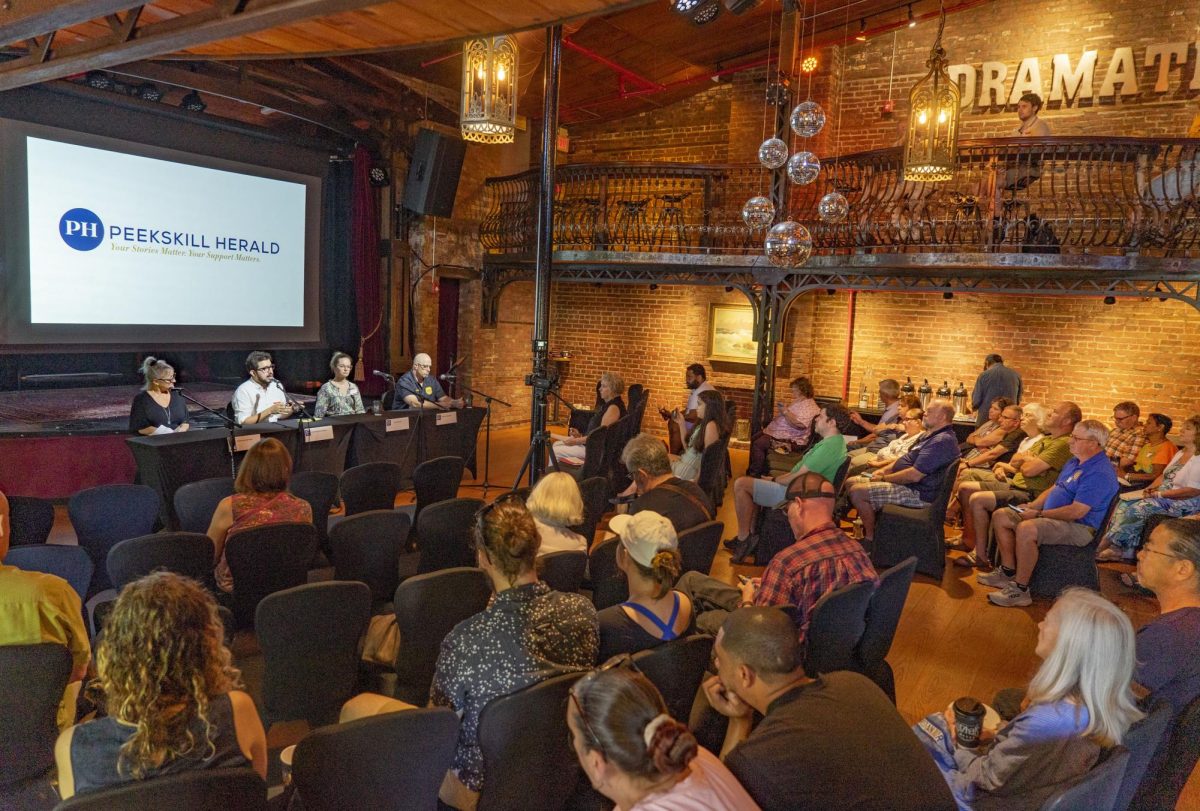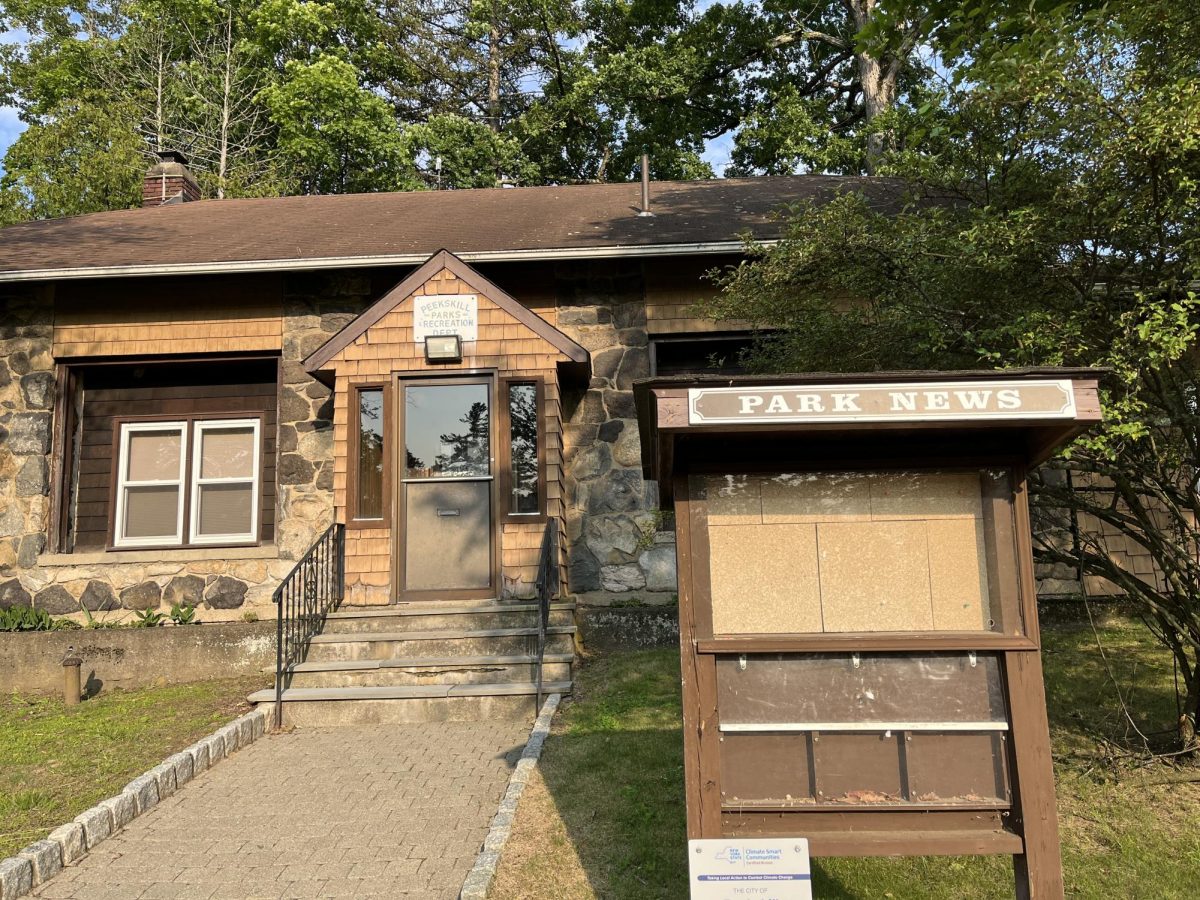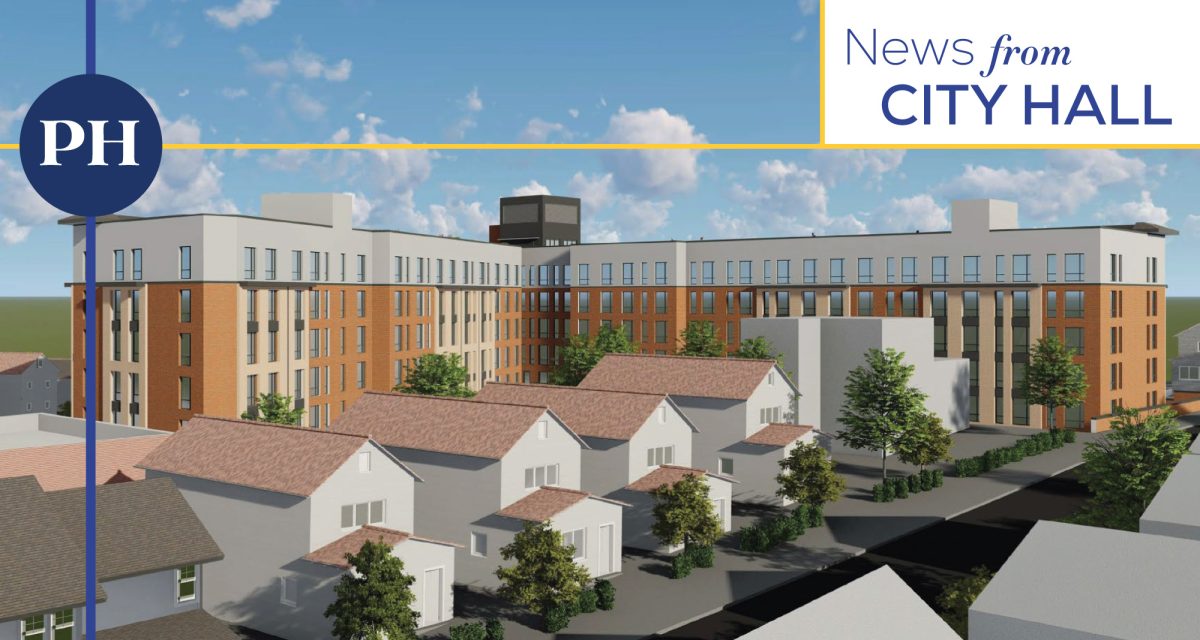Continuing under siege – that was the message Peekskill Plaza residents reiterated at the August 12 Common Council meeting. Residents from the 901 Main Street complex spoke about a lack of security, continued presence of interlopers, and unsafe living conditions.
Nearly 60 people attended the Peekskill Common Council meeting at the Neighborhood Center on the morning of August 12. This annual morning meeting of the Common Council is held at the Neighborhood Center for individuals who may not be able to attend the regular evening meetings.
The Common Council, at the August 5 and 12 meetings, spent nearly five hours learning about a parking system that could raise hundreds of thousands of dollars for the city. They also discussed specific measures the city can take to reduce its carbon footprint, listened to beleaguered residents, and passed seventeen resolutions.

Also on August 12, Mayor McKenzie presented proclamations to three individuals. They performed life-saving measures on an individual at the Senior Citizen pool party on July 30. Elaine Jackson, Johnathan Zamora, Community Hub Director, and Savannah Cappelli (not in attendance at the meeting) received special recognitions from the city.
Downtown Parking Payment In-Lieu Fee
At the August 5 Common Council meeting, Director of Planning Carol Samol proposed establishing a payment in-lieu for parking in a limited area within the downtown district. That is, the city would offer future developers and current building owners the option to utilize existing city parking facilities, for a payment, instead of residences providing parking spaces on-site.
“We think that this will be an attractive option to developers because structured parking is expensive,” said Samol, noting that new parking structures can cost developers $30,000-$60,000 per space.
This system, which is designed to attract developers by providing an alternate way to meet parking requirements, would require developers to purchase spaces at city garages. This payment in-lieu fee would only apply to residential parking. Peekskill currently has an in-lieu fee for parking at the waterfront district.
According to Samol’s memo, payment in-lieu fees would fund the creation of more parking, city garage maintenance, and pedestrian and transportation improvements in the downtown. More specifically, Samol noted that fees could fund expansion of the James Street Garage, with 174 new spaces. This expansion could include up to 350 in-lieu parking spaces, which would generate the city up to $5.25 million. The Planning Department is currently focusing on the James Street Garage since the Nelson Garage has a waiting list, wrote Samol.
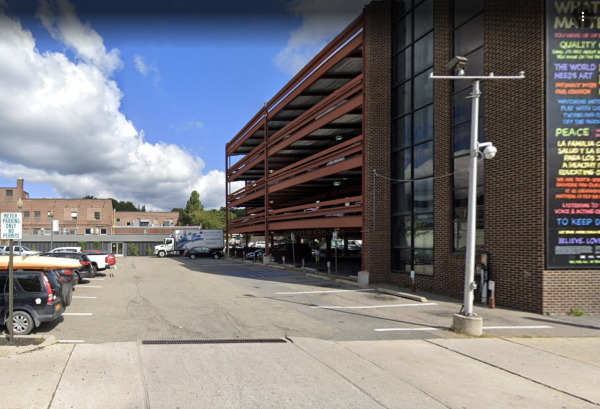
Projects that cannot provide on-site parking or seek to reduce or eliminate the number of spaces provided on site could take advantage of this system. Samol states that if multiple entities share parking at city garages, fewer spaces would be needed to serve the city’s mixed-use downtown district.
The Peekskill Planning Department proposes a uniform in-lieu fee of $15,000 per space, with an additional $200 parking maintenance fee for each parking space. Further, developers would need to purchase a parking permit for each space to be distributed to residents of the building. Currently, the individual permit fee is $318-480 per year.
The Planning Department estimates that there are eight to ten sites across the downtown which, if built to capacity, would result in at least 400 units eligible for an in-lieu parking option.
Current zoning regulations allow waiver of parking spaces if a development is within 500 feet of a municipal garage. The Planning Department recommends adjusting this distance to 1,000 feet (5-6 minute walk from the garages) to allow a broader range of development sites to take advantage of the in-lieu fee.
Samol stated in her memo that if a residential development requires more than 40 parking spaces and the property owner wishes to have parking on-site, they would have to make a case to the Planning Commision that on-site parking is needed and a waiver of parking would not be practical. At most, 60 percent of required parking would be permitted on site and the remainder would be subject to the payment in-lieu fee.
“I certainly like the flexibility for the developer. I also like the flexibility that it will allow the developer to concentrate on housing more than parking. Also, help us maintain our parking, which is in need,” said Councilman Brian Fassett.
The following week, at the August 12 Common Council meeting, Samol presented council members with different scenarios that could occur with the proposed in-lieu fee. James Guerriero’s 201 North Division Street project, a proposed development , was used as an example. Guerriero’s project calls for the waiving of 21 residential spaces due to its proximity to a city garage. According to Samol’s presentation, a payment in-lieu fee for the 21 off-site spaces could generate the city $315,000.
City staff will prepare a zoning text amendment and present it to the council for consideration at a future meeting. The council will also need to consider a grandfather or exemption clause for projects currently in process.
Climate Action Plan on Emission Reduction
Three significant climate hazards are expected to affect New York State residents this century: increasing temperatures, rising sea levels, and changing precipitation patterns. To mitigate the effects climate change will have on future generations, many cities are creating Climate Action Plans (CAP): frameworks for measuring, tracking, and reducing greenhouse gas emissions, which also propose various climate adaptation and mitigation measures.
At the August 5 Common Council meeting, Jannelle Koszarek, Interim Executive Director for the Center for Economic and Environmental Partnership, Inc. (CEEP), and Emma Kaminiski, the city’s Sustainability Coordinator, presented Peekskill’s Climate Action Plan on Emission Reduction to the council. The plan was produced by the City of Peekskill with assistance from CEEP, ICLEI – Local Governments for Sustainability USA, and the Hudson Valley Regional Council.
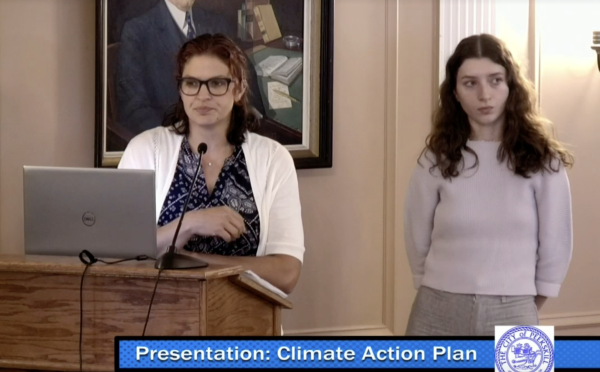
The Climate Action Plan was informed by a Local Government Operations inventory that analyzed emissions from 2019.
From this inventory, the most greenhouse gas emissions were generated by four of the city’s activities: Vehicle Fleet, Buildings & Facilities, Employee Commute, and Solid Waste.
The Climate Action Plan suggests mitigation strategies in these areas because of the impact on emissions, additional benefits (such as cost savings and air quality), and they are most feasible based on the work the city is already undertaking.
- Vehicle Fleet strategies: Anti-Idling Policy for Municipal Vehicles, adopting a Fleet efficiency policy prioritizing electric vehicles (or plug-in hybrid) purchases, and installing electric vehicle charging infrastructure
- Building & Facilities strategies: The city will look to convert to heat pumps and install photo-voltaic solar panels on municipal projects.
- Employee Commute: The city will consider adopting a policy allowing for remote work for municipal staff.
- Solid Waste: Pass an environmentally friendly purchasing policy.
Koszarek and Kaminiski also presented timelines for each strategy, assignment of responsibilities to departments, and goals.
“All strategies of the CAP are voluntary meaning that adopting the plan, as a whole, does not mean that you are agreeing to all strategies within that plan” said Koszarek.
Koszarek and Kaminiski also noted that a climate vulnerability assessment survey is available for community members’ input; responses will be compiled and included in the city’s Comprehensive Plan and the city’s Climate Adaptation Chapter. Koszarek and Kaminiski recommended that the city adopt the Climate Action Plan before completion of the Climate Adaptation and Vulnerability Chapter.
“Adapting the action plan now allows for the planning team to work towards a common goal that’s written in the plan, while developing an adaptation plan,” said Koszarek. She added that adopting shows commitment to efforts of emissions mitigation and is valuable when seeking funding.
Councilman Dwight Douglas stated that he doesn’t think the city is in a position to do major investments for the strategies within the CAP and will have to rely on grants. Koszarek reassured Douglas that they are always trying to identify grant funding to support changes that the city wishes to make.
Mayor Vivian McKenzie commented, “We’re very excited to be working with you. We’re excited for the work that you’re doing within the city and moving us forward and helping us to try and reach these goals. Budget or not, we’re going to do our best that we can to reach these goals because everyone that’s sitting here knows just how important it is to make sure that we’re promoting climate change safety and we want to make sure that we have a great place for us to live and our next generations to live.”
A resolution adopting the CAP is expected to be brought back to the council in September.
To view the CAP, click here.
Dangerous Building Litigation Retainer
The City of Peekskill is preparing to take legal action against properties that continuously interfere with the interest of the public and the quality of life.
The city has identified three properties that have become repeat offenders with multiple violations and plan to take action against those properties, according to Corporation Counsel Michael Hartman. The properties were not disclosed during the council meeting, although at the August 12 meeting, City Manager Matt Alexander implied that 901 Main Street is one of those buildings. The litigation is expected to fund itself, noted Hartman, meaning that any monies granted to the city by a court will cover the costs of outside counsel.
The Common Council unanimously passed a resolution authorizing the execution of a retainer agreement with outside counsel to represent the city in certain dangerous building and property matters on August 12.
Citizens Desiring to be Heard
Twelve residents spoke on various topics during the citizens desiring to be heard portion of the August 12 meeting.
Resident Nancy Wareham-Gordon, who lives at River Pointe Apartments, told the council that tenants at River Pointe were recently sent a letter stating there would be a 8.25 percent rent increase effective in November. Ms. Wareham-Gordon requested that the council consider opting into the Prohibition of Eviction Without Good Cause Law, which would give renters the right to continue living in their homes without fear of unreasonable eviction or extreme rent increases.
Many residents from 901 Main Street came to the meeting to voice their discontent with the lack of improvement at their building, after initially voicing their issues in May.
“Nobody cares about us at 901 Main Street,” said tenant Elizabeth Jones, who was visually frustrated with the lack of progress.
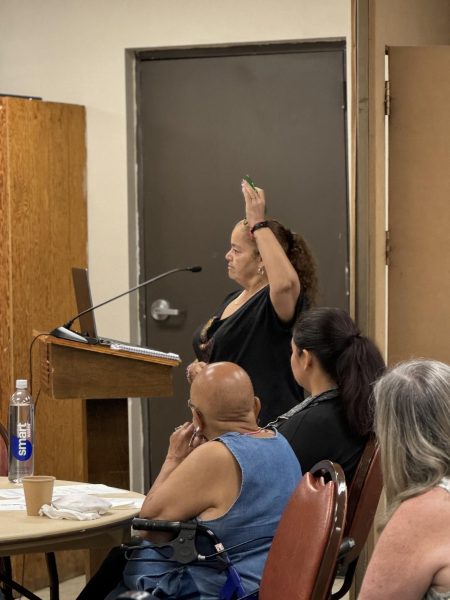
Jones acknowledged that security measures were put in place by Marathon Development Group (the building’s management company), after tenants’ first appearance before the council. However, she stated that since then security measures have declined, with little to no security personnel present to ensure residents’ safety. She recalled the police department having to escort seven people out of the building the previous week.
Gladys Mateo spoke of her current living situation to the council, saying that many of her neighbors upstairs were contributing to the problem.
Two Peekskill Plaza tenants spoke of their apartment floor and stairs being infested with dog feces due to a neighbor who continuously lets their dog loose. One resident is worried about her long-term health, given that she has asthma.
Another tenant suggested cameras be installed in hallways in order to catch people who are contributing to the problems.
Mayor McKenzie stated, “As a city, we are working hard with the owners there to try and make them do what they’re supposed to do for you. Remember it is privately owned, but the city is aware of all your concerns, our police department is aware of your concerns, and our city manager is working diligently with the owners.”
Tenants who continue to have issues at Peekskill Plaza are encouraged to reach out to the City Manager’s Office: 914-734-4246.
Other resolutions passed on August 12
The Common Council unanimously passed a total of 17 resolutions at its August 12 meeting. They include:
- Authorizing the city manager to award a bid for resurfacing of streets.
- Authorizing the city manager to accept the 2024 Summer Youth Employment program grant award from the Westchester County Youth Bureau.
- Authorizing the city manager to submit CDBG applications to the Westchester County Consortium.
- Authorizing the city manager to issue requests for proposal for logo and branding consulting services.
- Authorizing the city manager to enter into an agreement with CPL for planning consultant services and Jean Friedman for zoning review services.
- Authorizing the city manager to submit an application for technical assistance through the urban land institute’s “technical assistance panel” program and obtain a letter of support from the Common Council.
- Scheduling a public hearing on September 9, 2024, for text amendments to the Peekskill city code to incorporate special temporary operating permits.
- Scheduling a public hearing on September 9, 2024, for text amendments to the Peekskill city code to update restaurant business hours.
- Authorizing the city manager to enter into an intermunicipal agreement with Westchester County providing prisoner transportation services.
- Authorizing the city manager to sign a letter of support for Westchester County’s application for the Clean Mobility program.


